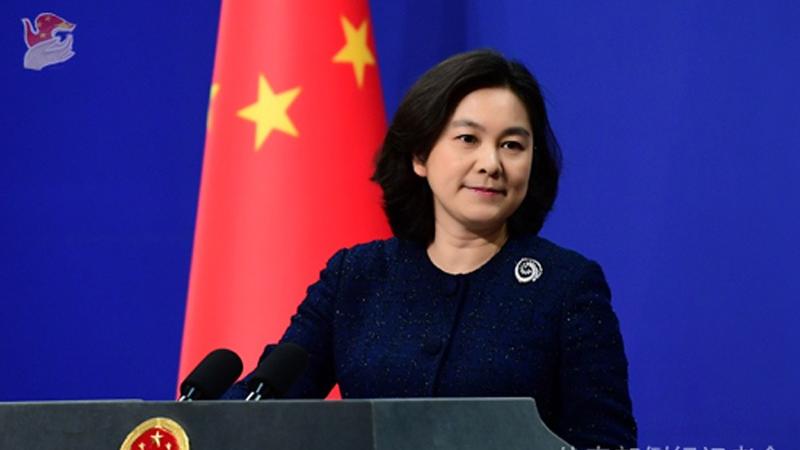
The New York Times reports: "China on Thursday ridiculed but did not exactly deny an article in The New York Times detailing how Chinese intelligence agents eavesdropped on cellphone conversations President Trump had with friends in hopes of gaining insights into the administration's policies. A spokeswoman for China's Ministry of Foreign Affairs, Hua Chunying, suggested that 'some people in the United States' were competing for 'the Academy Award for Best Original Screenplay,' and even used a familiar Trump trope, warning the newspaper that it risked being called 'fake news.' She went on to warn that the most secure way to avoid telephone intercepts was not to use "any modern communication devices." Almost certainly prepared for questions about the matter, Ms. Hua seemed to be enjoying the opportunity to discuss the article's details. She even offered a plug for a Chinese competitor of the iPhones that Mr. Trump favors — to the apparent dismay of his security advisers. 'If they are very worried about iPhones being tapped, they can use Huawei,' she said, referring to the telecommunications giant that has itself raised security concerns in the United States as potentially vulnerable to Chinese intelligence agencies."
The Washington Post reports: "In a midtown Manhattan conference room, Chinese Foreign Minister Wang Yi vented to a small group of prominent American business executives about how China had been betrayed, again and again, by a fickle United States. Chinese leaders believed they had a trade agreement last year with Commerce Secretary Wilbur Ross, only to see President Trump veto it. In May, they reached a second deal with Treasury Secretary Steven Mnuchin, but Trump again turned thumbs down — this time via Twitter. Then in September, as China prepared to dispatch a top official to discuss possible concessions, the president preempted the trip with new tariffs. 'They do not seem to want to talk,' Wang said at the private gathering in late September, according to one attendee. 'We don't know if they're uncoordinated, or if they're negotiating in bad faith.'"
The Economist reports: "When scholars of international relations predicts that the 2000s will be a 'Chinese century', they are not being premature. Although America remains the lone superpower, China has already replaced it as the driver of global change. There is one economic metric on which China already ranks first. Measured at market exchange rates, China's gdp is still 40% smaller than America's. However, on a purchasing-power-parity (ppp) basis, which adjusts currencies so that a basket of goods and services is worth the same amount in different countries, the Chinese economy became the world's largest in 2013. Although China is often grouped with other 'emerging markets', its performance is unique: its gdp per person at ppp has risen tenfold since 1990. In general, poorer economies grow faster than rich ones, because it is easier to 'catch up' when starting from a low base. Yet in other countries that were as poor as China was in 1990, purchasing power has merely doubled."
- 2018-10-24 Japan and China, Asian Rivals, Are Trying to Get Along
- 2018-10-23 China Officially Launched the World's Longest Sea Bridge Linking Hong Kong and Macau to the Mainland
- 2018-10-22 China's battered stock market just had its best day in years
- 2018-10-21 China's slowing economic growth should not be a concern
- 2018-10-19 Mike Pompeo Warns Panama Against Doing Business With China
- 2018-10-18 China’s weak currency is helping it in the trade war — but Beijing doesn’t want it to fall further
- 2018-10-17 Trump Opens New Front in His Battle With China: International Shipping Image
- 2018-10-16 $6 trillion of local government debt may be lurking under the surface in China
- 2018-10-15 Blame the U.S. for the Weaker Chinese Currency
- 2018-10-14 'You tell me': China ambassador stumped on who aids Trump on trade
- The New York Times China Mocks Report It Tapped Trump's iPhone (and Plugs Its Own Competitor)
- The Washington Post Crossed wires: Why the U.S. and China are struggling to reach a trade deal
- The Economist The Chinese century is well under way
- Forbes U.S. Car Exports To China Drop 56%
- CNN Donald Trump's unconventional diplomacy is pushing China and Japan closer together
- CNBC China and Japan are expected to ink 'a lot' of deals as their leaders meet in Beijing
- TIME China Calls Report It Is Spying on President Trump's Phone 'Fake News'
- CNBC US won't talk to China on trade until it gets specific plan to halt tech theft
- The Washington Post A more assertive Beijing raises new questions for U.S.-China relations
- Associated Press Retired US general says war with China likely in 15 years
- The New York Times A 'People's Pig' in China Could Be Headed to Upstate New York
- CNN Mercedes is going after China's ride-hailing market
- Business Insider Trump's trade war with China is starting to get nasty for US companies
- The Economist Will China's rivals benefit from the trade war?
- Associated Press Japan's Abe in China as 2 nations try to mend ties
- The New York Times China Locks Up Ethnic Minorities in Camps. It Says So Itself.
- Politico China Must End Its Campaign of Religious Persecution
- Brookings Abe in Beijing: The quiet accommodation in China-Japan relations
- Market Watch These are all the reasons U.S. investors should keep worrying about China
